Pay Off Your Credit Card Debt With These 11 Steps

Debt was already a significant hurdle for Americans in the years leading up to the COVID-19 pandemic; back in 2018, a study by Northwestern Mutual found that average personal debt (exclusive of home mortgages and among those with some debt) surpassed $38,000.
The situation is far more dire now, as we near the third year of pandemic living.
The average U.S. household carries $155,622 in debt -- that's a collective $15 trillion -- up 6.2% from January 2021. The debt comprises student loans and mortgages and yes, credit card debt. Lots and lots of credit card debt.
Learn More: 9 Bills You Should Never Put on Autopay
Find Out: What Is the Highest Income for Food Stamps in 2022?
No debt is fun, but credit card debt can be the most vicious because it tends to boast the highest interest rate and can tank your credit score if not aggressively managed. When you're dealing with high credit card debt as so many of us are, it can feel impossible to get out of the hole, but you have to start the process ASAP.
"Debt has escalated during the crisis as people have had to find ways to pay their most urgent bills," said Dr. Guy Baker, author and founder of Wealth Teams Alliance. "Once order is restored, the debts will have to be eliminated."
It can be a painful process, Baker emphasized, but it's a doable one. Even if your debt is mighty, there is a clear and well-traveled path to financial solvency. You might not entirely ease yourself of credit card debt in 2022, but you can take substantial steps to minimize it so that someday, you will be free. What exactly are those steps? GOBankingRates consulted a number of financial experts to find out.
Here's your 11-step plan to tackling credit card debt this year.

1. Tally Up, Review and Analyze Your Debts
According to Howard Dvorkin, CPA and chairman of Debt.com, the first step to tackling debt is to take a full inventory of your debts. "Know how much is owed, to whom and where (you) are with payments," he said.
As you do this, you'll want to check for anything that might look suspicious to you (identity theft is alive and well). From there, take the time to scrutinize your spending behavior and patterns.
"Take a hard look at where your money is going and how much is coming in," said Nishank Khanna, CFO of Clarify Capital. "Understanding your financial habits will give you a solid idea of where you're overspending and where you can feasibly cut back in order to save. Oftentimes, our spending patterns tell us a surprising story about how we interact with money."
Dvorkin added that it's important also to download your latest credit report.
Live Richer Podcast: First-Time Homebuying During Inflation: Is It Worth It?
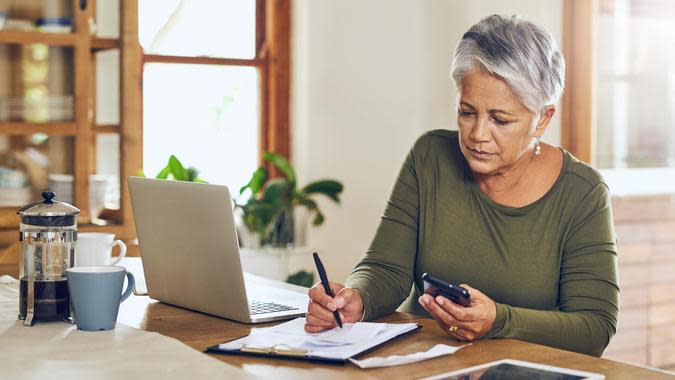
2. Make a Spreadsheet Budget
"The best way consumers can start paying off credit card debt is to make a budget spreadsheet to track their income and expenses," said Rick Orford, personal finance expert and writer for The Financially Independent Millennial. "Consumers can start by looking at their last three months' income and expenses and organize them on a spreadsheet."
From there, Orford advises that you distinguishing your wants from your needs. "Needs are things like rent, mortgage, insurance and so on," he says. "Wants are things that make us feel like we're keeping up with the Joneses."
Another way to think of this is to separate nonessentials from essentials and commit to only spending on the essentials. Keep your spreadsheet always handy to hold yourself accountable and to track your spending.
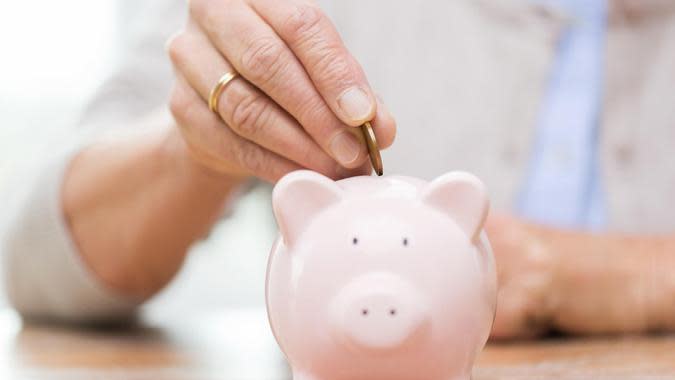
3. Establish (or Keep Building) an Emergency Fund
Technically this step could go under the budgeting step, but it's so important, it's worth breaking out into its own step. When you're making that budget of essentials, make sure you factor in a portion of money that will go directly into an emergency fund. This isn't just you being extra cautious -- this is you helping yourself to avoid falling into even more debt as time goes on.
"It's never been more important to put money aside for an emergency fund," said Khanna. "Before you pay off your debt, here's still quite a bit of financial uncertainty which will likely continue to be present throughout 2021. Before you pay off your debt, you'll want to build a nest egg, if you haven't already. Emergency funds work as financial safeguards. Debt can be an unavoidable survival mechanism when you have nothing saved. Stashing away cash protects you from running into a situation where you need to increase your debt burden in order to survive."
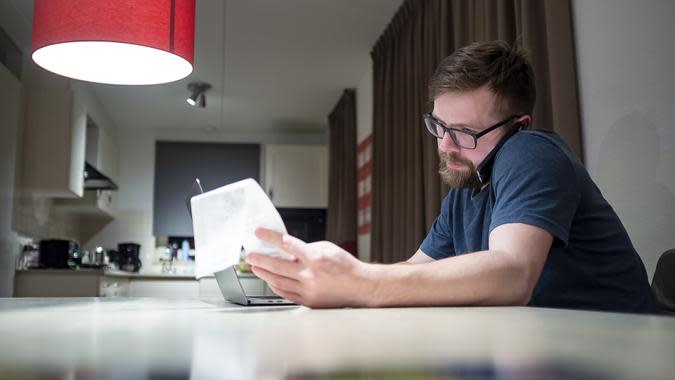
4. Talk To Your Credit Card Providers About How They Can Help
If you're buried in debt and you don't see any way of getting out, take the time to talk to your credit card provider(s) to learn how they might be able to make the situation less terrible. True, these financial institutions aren't exactly known for their overflowing empathy, but they also want to retain your business.
"Most credit card companies offer relaxation on the interest rates when you have trouble paying your bill, so try to speak to customer service or a hardship officer," said Marius Thauland, a financial expert at Sumo Finas. "Let them know you are having trouble paying off your debt. They might lower your interest for a period or waive current late fees to give some breathing room."

5. Investigate Various Debt Relief Processes
Once you've assessed your debt, look into options for debt relief. What is available to you depends on the nature and severity of your debt.
"See if (you're) eligible for a balance transfer offer," said Dvorkin. "For those with $5,000 or less in credit card debt, this is one of the fastest ways to pay off debt. A recent New York Fed Credit survey showed that credit card rejections have risen. This may mean less balance transfer offers for those with gaps in employment and income."
For those with high minimum payments, Dvorkin suggests investigating debt consolidation. "This is a good option for those with up to $25,000 in credit card debt," he said.
A debt management program is better suited as an option for people with over $25,000 in credit card debt or bad credit. "Back in June[2020], the CFPB released its quarterly report on debt settlement and credit counseling trends. In this report, it predicted a rise in debt settlements as our economy weathers another economic downturn," Dvorkin said.
And finally, there is the option of debt settlement. This option should only be sought out by those who "don't care about the credit damage but want to get out of debt without declaring bankruptcy," said Dvorkin. Bankruptcy is what you should look into only if there's no other way out and you've received trusted counsel on the matter.

6. Consider Refinancing Your Mortgage, If Applicable
"Oftentimes, once credit card debit is accumulating, you are paying a significant amount of interest each month. Some credit cards are even in the twenties in terms of percentages," said Melissa Cohn, executive mortgage banker at Raveis Mortgage in New York.
"If you do own a home with equity in it, consider taking on a cash-out refinance on your home loan, which will leave you closer to the threes in terms of interest payments and eliminate those balances," Cohn said. "Carrying high balances has a significant impact on your credit score, so this can be one of the first steps toward repairing it as well. It is better to carry a small amount of debt across a number of credit cards than to accrue all on one if possible. Contact your lenders to see what lower rate loans are available."
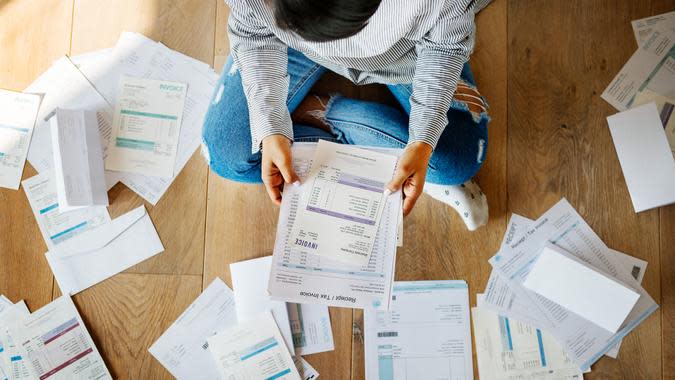
7. Set a Deadline for Debt Relief -- Even If It's Far Off
Work out how long it will take you to pay down your debt. (For starters, just find a debt payoff calculator online; there are numerous free options, including this one from FinancialMentor). Once you work out a deadline, keep it top of mind -- even if it's years away. This is important because it helps cement the deadline as a goal.
"When it comes to setting goals, it's always been a best practice to have a deadline for accomplishing your goal," said R.J. Weiss, a certified financial planner and founder of the personal finance site The Ways to Wealth. "As soon as you're done tallying up your debts, it's important to set a deadline for when you plan to pay off your debt. Most importantly, you want to update your deadline at least once a month based on your progress. Staying motivated through the debt payoff process is hard. That's why having a target date to pay off your debt is so important. It keeps you focused on what matters."
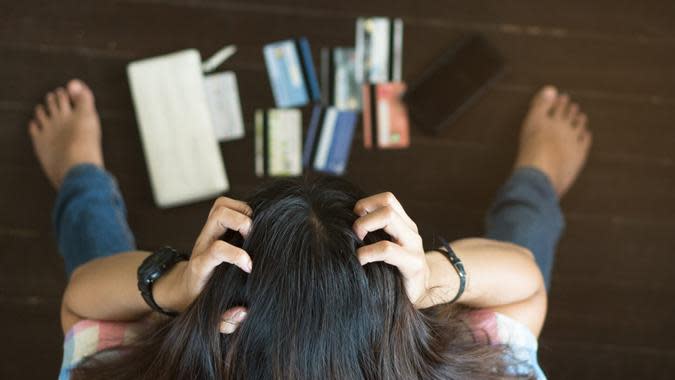
8. Prioritize Which Credit Card You'll Pay Down First
While you need to make at least the monthly minimum payments on all your cards, you should focus on paying down one card at a time
"Typically start with highest interest rate debt and work your way down to the lowest interest rate," said Tracey Bissett, CFA, president and chief financial fitness trainer at Bissett Financial Fitness. "From a psychological/mindset point of view, it may be a good quick win to pay off a smaller balance on one card -- this will give you confidence to keep going."
Bissett also encourages people to make payments as often as possible, not just once a month, as doing so "will reduce the amount of interest that continues to accumulate, as the principal balance will always be reducing."
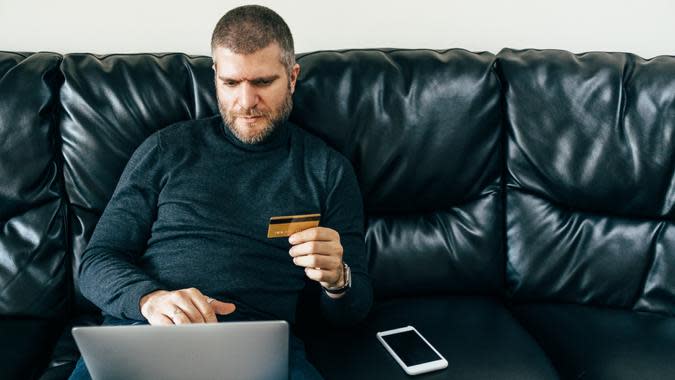
9. Stop Using Credit Cards (as Much as Possible)
Remember that when you're paying off a card, you have to keep it off the table. Consider it dead and gone. Ideally you should stop using all credit cards, but if you must use one, use it only for essentials like groceries or gasoline. Also, try to get creative with ways you can pay.
"If you have some kind of rewards on your cards, can you use them to pay for your existing expenses, give as gifts so you don't spend money and/or get the rewards and sell them for funds to pay down the card balance?" said Bissett. "Think about rewards that give you things like gift cards or physical goods like electronics or small appliances."

10. Enlist a Support Buddy
Paying down debt can be an emotionally draining task. It is normal to feel overwhelmed and like you may never truly break through to the other side (it's called "debt fatigue," FYI). You don't need to go through this alone, and while you can absolutely pay a financial coach or even financial therapist to help provide you coping tools and strategies, the cost of such services might be beyond your budget. Letting others in can be helpful if you're struggling or even if you feel like you might benefit from some extra accountability.
"Tell your family and friends that you are paying off your credit card debt," said Sundin. "This step works out two advantages: you get some support for your effort and help reduce temptations. And more often than not, you may find someone else is doing the same thing. Now you have a support buddy and both of you can help track your debt progress and stick to your payment plans."

11. Patience! Change Is Hard
"Be kind to yourself," said Bissett. "You are most likely feeling guilt, shame, embarrassment or other negative emotions. You are not alone and you will get through this. The majority of people with credit card debt don't have an overspending problem. There is usually something that has happened that led to the accumulation of debt that was beyond your control, i.e., job loss, illness, divorce, business failure or in the case of [late], a global pandemic."
Remember, too, that you aren't only paying off debt -- you're changing your financial habits, something that takes courage and patience.
"Change is hard; it takes truly wanting to have a different outcome (and) most people never change their habits," said Carma Peters, CEO of Michigan Legacy Credit Union. "You have to be so sick of where you are that you want something different for the rest of your life. That is how truce change happens. Starting to exercise is one right decision every day, so is changing your financial habits."
More From GOBankingRates
This article originally appeared on GOBankingRates.com: Pay Off Your Credit Card Debt With These 11 Steps
